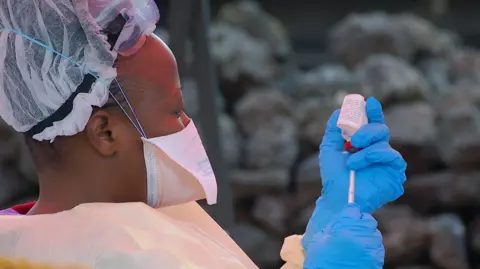In recent months, Sierra Leone has been battling a drastic surge in mpox infections, prompting health officials to urgently seek support from the United States and the international community. The West African nation is currently facing a public health crisis, with infections surpassing totals seen in previous years and affecting all regions, including its capital, Freetown.
In an effort to alleviate pressure on the healthcare system, Sierra Leonean authorities had initially implemented a strategy to treat mpox patients in their homes. This decision was made to encourage patients with other health issues, such as malaria or complications from pregnancy, to seek the medical attention they need. However, this approach has resulted in unforeseen consequences. Infections have spread more rapidly in densely populated urban areas, leading to an overwhelming number of cases.
The government's response has included the establishment of multiple centers to isolate and treat mpox patients. Nevertheless, these facilities are operating at capacity and with insufficient resources, as they grapple with a critical shortage of vaccines. In April, health officials were forced to suspend public health initiatives aimed at tracing individuals who may have been exposed to the virus, primarily due to budgetary limitations.
Expert assessments underscore the fragile state of Sierra Leone's healthcare system, which is currently compounded by a broader financial crisis and reduced global development assistance. Dr. Ngashi Ngongo, a key figure in the mpox response from the Africa Centres for Disease Control and Prevention, highlighted the dire conditions facing the country's healthcare infrastructure, emphasizing the urgent need for both immediate and sustained support to manage the outbreak effectively.
As cases continue to rise, there is a pressing demand for international intervention and resources to bolster Sierra Leone's efforts to combat this public health emergency and protect its vulnerable populations.
In an effort to alleviate pressure on the healthcare system, Sierra Leonean authorities had initially implemented a strategy to treat mpox patients in their homes. This decision was made to encourage patients with other health issues, such as malaria or complications from pregnancy, to seek the medical attention they need. However, this approach has resulted in unforeseen consequences. Infections have spread more rapidly in densely populated urban areas, leading to an overwhelming number of cases.
The government's response has included the establishment of multiple centers to isolate and treat mpox patients. Nevertheless, these facilities are operating at capacity and with insufficient resources, as they grapple with a critical shortage of vaccines. In April, health officials were forced to suspend public health initiatives aimed at tracing individuals who may have been exposed to the virus, primarily due to budgetary limitations.
Expert assessments underscore the fragile state of Sierra Leone's healthcare system, which is currently compounded by a broader financial crisis and reduced global development assistance. Dr. Ngashi Ngongo, a key figure in the mpox response from the Africa Centres for Disease Control and Prevention, highlighted the dire conditions facing the country's healthcare infrastructure, emphasizing the urgent need for both immediate and sustained support to manage the outbreak effectively.
As cases continue to rise, there is a pressing demand for international intervention and resources to bolster Sierra Leone's efforts to combat this public health emergency and protect its vulnerable populations.



















